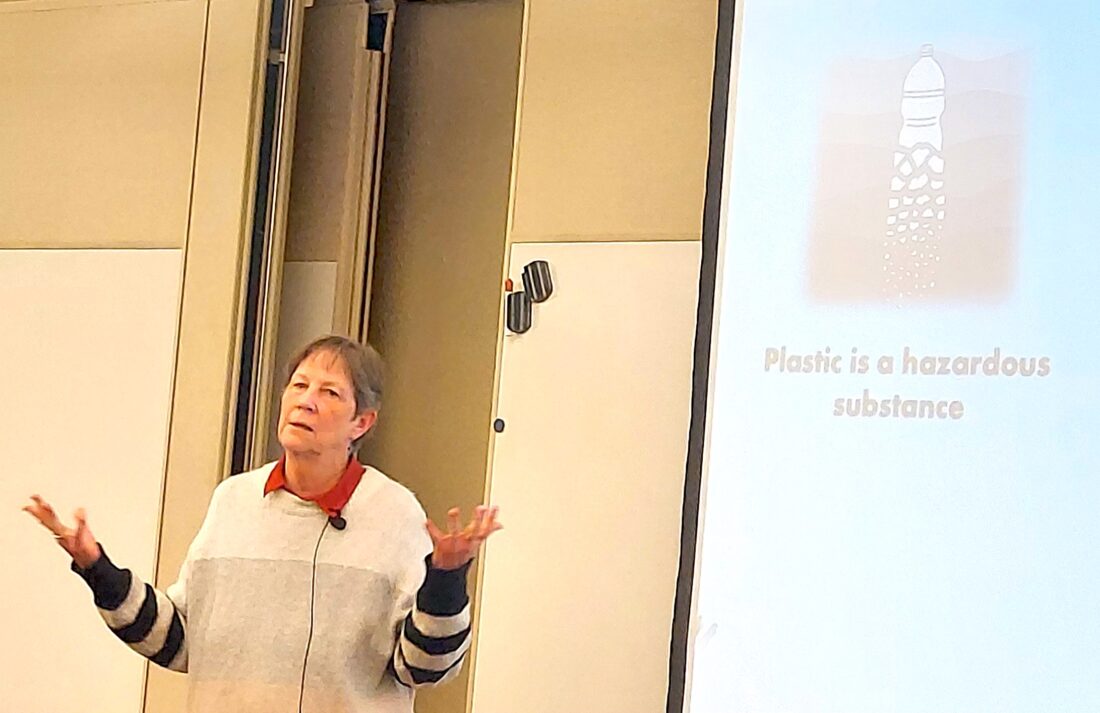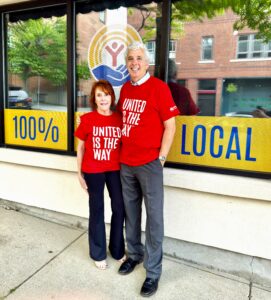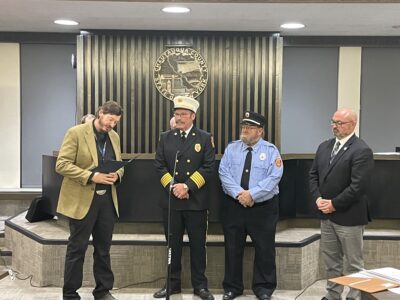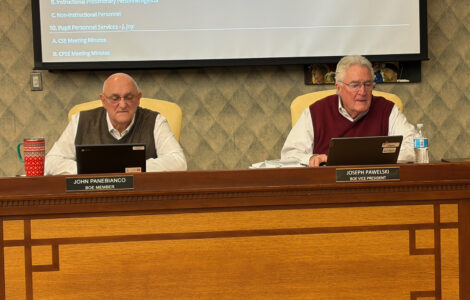Drastic On Plastic
Speaker Blasts Environmental Effects Of ‘Stuff’

Kimberly Cameron gestures during a presentation about the dangers of plastics at SUNY Fredonia. Photo by M.J. Stafford
A recent presentation at SUNY Fredonia flashed some grim results of the world’s love affair with plastic.
Presenter Kimberly Cameron asserted that the long breakdown time of plastics, their corrosion into smaller pieces, and their hazardous chemicals make them such an environmental hazard, that people must use them less.
Cameron is a SUNY Cortland professor. The SUNY Fredonia Chemistry Club and the League of Women Voters of Chautauqua County were among the Williams Center presentation’s sponsors; Cameron is president of the LWV’s Cortland County chapter.
About 40 people attended — there was a scattering of students but the crowd trended older.
“You might ask yourself, ‘Why am I here?’ I will do some pretty crazy things for my grandchildren,” Cameron said toward the beginning of her talk. “Us old geezers, this won’t affect us the way it will affect them.”
She quickly flashed a line graph, showing that people born in 1960 came into a world with hardly any plastic, compared to the surge since then. The graph showed plastic production constantly soaring to new heights over time.
“We think of it as being elsewhere,” Cameron said of plastic’s environmental effects. “We don’t think about the reality, which is, it’s everywhere.”
She went on, “42% of current plastic production is packaging. We can change that.”
However, “since COVID, we have even more of this damn stuff in our grocery stores.”
Merchandising is a big source of plastics, but Cameron also took aim at agriculture. “There is so much plastic right now in our farming,” used for weed control, haystack covers and even seed coatings, she said. While most of it cannot currently be recycled because it is too dirty, “let’s think about how to recycle this stuff.”
The professor, who has a Ph.D in plant physiology, tried to show how plastics break down into microplastics that get absorbed by plants and animals.
“We really don’t know the impact” of these on humans, though research has exploded in the past four years, Cameron said. However, scientists do know “we are ingesting these and they are getting into our hearts and lungs and brains,” though the exact health effects are yet to be determined.
The world produces 275 million metric tons of plastics each year, and “it is going into landfills, it is going into the garbage, the vast majority of it,” Cameron continued.
More than 16,000 types of chemicals are added to plastics, and only 1% is regulated. Most of the chemicals’ composition are proprietary information, “and in our country, proprietary information has precedence over helping the public,” Cameron said.
She touched on the controversial “PFAS” plastics which produce “chemicals that, unfortunately, do not break down in the environment.” She wondered, “Why the hell do we have a chemical that doesn’t break down, in a product meant to use once and throw away?”
Just 3-5% of plastics actually get recycled. “We cannot recycle our way out of this problem. It is too big and too deep,” Cameron said,
She claimed that the Trump administration is adding rollbacks and exemptions to a new regulation limiting PFAS in drinking water to four parts per trillion. She advocated a letter-writing campaign against that, and added, “Let’s get us all to run the same way — towards the problem, so we can solve it.”
The obvious solution to all the negative environmental impacts is to stop making plastic — but that is not going to happen, Cameron acknowledged.
“We need plastic. It really does some fantastic things. We don’t need single use plastic,” she said.
Cameron closed her talk with steps that people can take if they are concerned about plastic pollution. Step 1 was “think outside the box,” Step 2 was “work together,” and Step 3 involved strengthening laws and regulations. Step 4 was to “bring it home to the community” with letters, advocacy, etc.
Cameron noted her involvement with beyondplastics.org, a web site advocating on the issue. She directed people to books and pamphlets at the rear of the room, many of which were from the organization.





